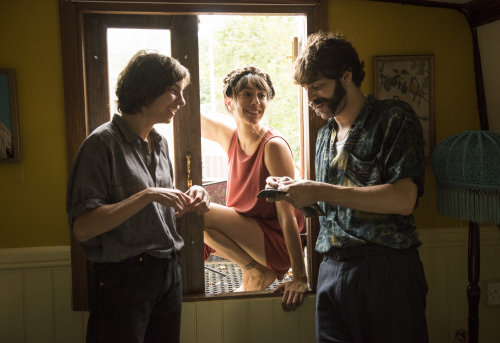
Wolfe Video
MOVIE REVIEW
Anchor and Hope (2018)
Eva (Oona Chaplin, a k a the first to die at the Red Wedding of “Game of Thrones”) is English; Kat (Natalia Tena, aka Tonks from the Harry Potters) is Spanish. They are a happy couple living on Kat’s canal boat in east London. We meet them at the funeral for their beloved cat, which takes place right before Kat’s old friend Roger (David Verdaguer) comes from Barcelona, Spain, for a long visit. And bam! Suddenly a pair of firmly committed lesbians decides to embark upon something as heteronormative as motherhood without having a single sober conversation about it. Before we examine what goes wrong with that choice, let’s discuss what goes right.
The strength of the relationship between Kat and Eva is unquestioned; and it’s a delight to meet movie lesbians who don’t show one flicker of anxiety or regret for their choices. The friendship between Roger and Kat is adorable, the more so for their ability to code-switch between English and Spanish. Eva’s resentment of Roger slowly turning into a genuine friendship is a rare examination of how a relationship can be built solely by two people wanting the same thing. Ms. Chaplin’s willowy self-confidence drives the whole film, in a neat contrast to Ms. Tena’s scruffy disbelief at how her luck is holding. From time to time Eva’s unsubtly-named mother Germaine (Geraldine Chaplin, her mother in real life) brings a level of hard-won life experience that these three whippersnappers need more than they’d care to admit. So when the movie works, it’s because of what feels like real, tight-knit relationships between the main characters.
Women normally spend plenty of time debating buying a coat, much less parenthood; but Eva and Kat wake up from a night of drinking and only ask if there are twins in Roger’s family before handing him a cup in which to make a deposit. Based on this, director Carlos Marques-Marcet – who co-wrote with Jules Nurrish – has a lot of explaining to do. Is the loss of a pet honestly such a spur for turning your entire life upside down? Why is nothing articulated about Eva’s overwhelming and sudden desire to have a child, especially in the face of Kat’s obvious hesitation? And why is Roger so keen to help? Is the wish for a baby just assumed, and therefore beneath discussion?
But come on. Kat and Eva are a mess. There is very little sense of their daily lives beyond the necessary routine of the boat. They live a mostly workless life in one of the world’s most expensive cities without so much as a lock on their door. How can they afford their quinoa and red wine? Roger’s ability to drop his life to slide into theirs is barely commented on, either; all we learn is he has to borrow Eva’s phone to watch porn since he doesn’t even have his own. Why did they all choose to live like this? The movie’s decisive moment is a realization Kat makes (over the naked body of an actress, Meghan Treadway, with the toughest dialogue ever given to someone in a bit part) quite literally about shit, and it’s treated as a romantic epiphany instead of an unsavory whiff of things to come. How could these broke-ass dreamers even consider having a baby without the world catching up with them?
In “The Kids Are Alright,” we saw a settled lesbian couple that was delighted with their choice to be parents, but they still analyzed it to death anyway (and despite the kids being teenagers). The two movies don’t really compare, but “Anchor and Hope” acts as if it has the assurance of its decisions which Annette Bening and Julianne Moore brought to theirs. And “Anchor and Hope” does that in spite of the awkward scene at a child’s birthday party where Eva gives the seven-year-old building blocks more appropriate for a toddler. The child treats the gift with the correct level of contempt, and it’s left to the spectator to wonder aloud why Eva is so hell-bent on motherhood if she knows so little about children.
Furthermore, although Kat and Eva have different nationalities and different religions, there is no sense of culture clash within their relationship, or of having to unpick different implicit expectations of life, the universe or anything. To gloss over these things is yet another strange and lazy choice. Why wasn’t the creative team brave enough to make a Spanish movie that happened to be set in London?
Or are these problems because the creative team was mostly men?
Where “Anchor and Hope” badly misfires is in the assumptions it makes about what women want, and how women get it. A movie about two lovers who have rejected mainstream society, but who slowly realize that becoming parents pulls you into the mainstream whether you want to be there or not, would have been a fascinating thing. To see Kat and Eva as that couple, with their competing desires, especially since as a gay, mixed-nationality, itinerant couple, they are already triple outsiders, could have been something outstanding to watch. It’s a testament to the three main actors that “Anchor and Hope” works at all, but it’s maddening to see the much better movie this should have been just under the surface.
Comments